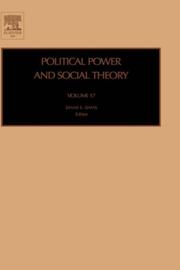| Listing 1 - 10 of 19 | << page >> |
Sort by
|

ISBN: 1566391504 1566391512 1439904855 Year: 1994 Publisher: Philadelphia : Temple University Press,
Abstract | Keywords | Export | Availability | Bookmark
 Loading...
Loading...Choose an application
- Reference Manager
- EndNote
- RefWorks (Direct export to RefWorks)
Urbanization --- Urbanisation --- History --- Histoire --- Mexico City (Mexico) --- Mexico (Mexique) --- Economic conditions --- Politics and government --- Conditions économiques --- Administration --- Politics and government. --- Economic conditions. --- Conditions économiques

ISBN: 0521807484 0521002087 9780521807487 9780521002080 051118512X 9780511185120 0511185952 9780511185953 9780511499555 0511499558 128045766X 9781280457661 1107143985 0511187807 0511313802 0511186878 9781107143982 9780511187803 9780511313806 9780511186875 Year: 2004 Publisher: Cambridge, U.K. : Cambridge University Press,
Abstract | Keywords | Export | Availability | Bookmark
 Loading...
Loading...Choose an application
- Reference Manager
- EndNote
- RefWorks (Direct export to RefWorks)
Perhaps the most commonly held assumption in the field of development is that middle classes are the bounty of economic modernization and growth. As countries gradually transcend their agrarian past and become urbanized and industrialized, so the logic goes, middle classes emerge and gain in number, complexity, cultural influence, social prominence, and political authority. Yet this is only half the story. Middle classes shape industrial and economic development, they are not merely its product; the particular ways in which middle classes shape themselves - and the ways historical conditions shape them - influence development trajectories in multiple ways. This is the story of South Korea's and Taiwan's economic successes and Argentina's and Mexico's relative 'failures' through an examination of their rural middle classes and disciplinary capacities. Can disciplining continue in a context where globalization squeezes middle classes and frees capitalists from the state and social contracts in which they have been embedded?
Middle class --- Industrialization --- Classes moyennes --- Industrialisation --- -Middle class --- -Industrialization --- -#SBIB:39A4 --- #SBIB:39A74 --- #SBIB:39A75 --- Industrial development --- Economic development --- Economic policy --- Deindustrialization --- Bourgeoisie --- Commons (Social order) --- Middle classes --- Social classes --- Toegepaste antropologie --- Etnografie: Amerika --- Etnografie: Azië --- Social conditions --- #SBIB:39A4 --- Social Sciences --- Sociology

ISBN: 9781849503358 1849503354 0762311908 9786610629626 1280629622 0080459625 9780080459622 9780762311903 Year: 2009 Publisher: Bingley Emerald Group Publishing Limited
Abstract | Keywords | Export | Availability | Bookmark
 Loading...
Loading...Choose an application
- Reference Manager
- EndNote
- RefWorks (Direct export to RefWorks)
Volume 17 of "Political Power and Social Theory" showcases scholarship by historical, political, and economic sociologists grouped around three broad subjects with both contemporary and historical relevance. The first is the relationship between race, class, and urban politics, and specifically, how racial and class identities interact with each other to produce social and political power dynamics in 20th century American cities. The second subject, the interaction of citizens, states, and social movements in both colonial and transnational context, turns away from the sub-national level of the city and examines social and political dynamics at the level of nations and even empires, although racial identities, social movements, and citizenship concerns remain relevant in several of these papers as well. Both U.S. and European cases are examined. The final topic of inquiry is the social origins of corporate irresponsibility, a problem that is explored through the lens of organizational theory, state-society relations, and the history of labor-corporate relations. Overall, the volume aims to open new historical, methodological, and theoretical lines of inquiry for sociologists, organization theorists, political scientists, historians, and others who seek to understand some of the most pressing inequalities and injustices of our times.
Political science. --- Political sociology. --- Power (Social sciences) --- Historical materialism. --- Dialectical materialism --- History --- Marxian historiography --- Empowerment (Social sciences) --- Political power --- Exchange theory (Sociology) --- Political science --- Social sciences --- Sociology --- Consensus (Social sciences) --- Mass political behavior --- Political behavior --- Administration --- Civil government --- Commonwealth, The --- Government --- Political theory --- Political thought --- Politics --- Science, Political --- State, The --- Philosophy --- Sociological aspects --- Social theory. --- Political science & theory. --- Political Science --- Philosophy. --- General. --- Social philosophy --- Social theory

ISBN: 0762302704 Year: 1998 Publisher: Greenwich (Conn.) : Jai press,
Abstract | Keywords | Export | Availability | Bookmark
 Loading...
Loading...Choose an application
- Reference Manager
- EndNote
- RefWorks (Direct export to RefWorks)
Book
ISBN: 9781849501545 1849501548 Year: 2009 Publisher: Bingley Emerald Group Publishing Limited
Abstract | Keywords | Export | Availability | Bookmark
 Loading...
Loading...Choose an application
- Reference Manager
- EndNote
- RefWorks (Direct export to RefWorks)
Book
ISBN: 9781849502221 1849502226 Year: 2009 Publisher: Bingley Emerald Group Publishing Limited
Abstract | Keywords | Export | Availability | Bookmark
 Loading...
Loading...Choose an application
- Reference Manager
- EndNote
- RefWorks (Direct export to RefWorks)
Book
ISBN: 9781849500951 1849500959 Year: 2009 Publisher: Bingley Emerald Group Publishing Limited
Abstract | Keywords | Export | Availability | Bookmark
 Loading...
Loading...Choose an application
- Reference Manager
- EndNote
- RefWorks (Direct export to RefWorks)
Book
ISBN: 1282457594 9786612457593 184950668X 1849506671 9781849506687 9781849506670 9781849506670 Year: 2009 Publisher: Bingley : Emerald,
Abstract | Keywords | Export | Availability | Bookmark
 Loading...
Loading...Choose an application
- Reference Manager
- EndNote
- RefWorks (Direct export to RefWorks)
It is an exciting time to consider changes in the field of comparative-historical sociology, as the discipline seeks to accommodate both old and new trends as well as the transforming spatial scales in which political power and social theory are increasingly embedded. Volume 20 of "Political Power and Social Theory" starts the ball rolling by showcasing articles that pursue similar themes. The question of what is old and what is new hovers over most of the contributions, particularly the peer-reviewed chapters in parts I and II, which consider such long-standing socio-historical concerns as power structure theory, class-based collective action, and empire - but examine them through new conceptual, methodological, and historical lenses. This year's volume also offers a critical treatment of the spatial or territorial dynamics of state hegemony, class power, ideologies of governance, and citizenship - with the latter theme most well developed in debate over the new geographies of citizenship in the Scholarly Controversy Section as well as in part-II's guest-edited section on Empire and Colonialism.
Political sociology. --- Power (Social sciences) --- Social sciences --- Philosophy. --- Social philosophy --- Social theory --- Empowerment (Social sciences) --- Political power --- Mass political behavior --- Political behavior --- Political science --- Sociological aspects --- Exchange theory (Sociology) --- Sociology --- Consensus (Social sciences) --- Social theory. --- Political science & theory. --- Political Science --- General.
Digital
ISBN: 9780292792982 Year: 2021 Publisher: Austin, Tex. University of Texas Press
Abstract | Keywords | Export | Availability | Bookmark
 Loading...
Loading...Choose an application
- Reference Manager
- EndNote
- RefWorks (Direct export to RefWorks)
Book
ISBN: 1280771720 9786613682499 1849505454 9781849505451 0762314184 9780762314188 9781280771729 6613682497 Year: 2008 Publisher: Bingley, U.K. : Emerald : JAI Press,
Abstract | Keywords | Export | Availability | Bookmark
 Loading...
Loading...Choose an application
- Reference Manager
- EndNote
- RefWorks (Direct export to RefWorks)
"Political Power and Social Theory" continues its longstanding run as a premier volume of comparative and historical social science. The volume focuses on a variety of questions relating to states, citizenship, and power, common themes examined with divergent analytical entry points and through deep knowledge of country cases as diverse as Russia, the United States, El Salvador, South Africa, and Israel. Whether examined with a focus on revolutions and political parties, or cities and their physical and social transformation, or through development of the concept of the 'familial state', which marries a preoccupation with lineage and micro-cultures to that of national-state institutions, these articles expand our theoretical and methodological imagination of how citizens become included or excluded in local and national structures of power.
Political science. --- Sociology. --- Power (Social sciences) --- Empowerment (Social sciences) --- Political power --- Social theory --- Administration --- Civil government --- Commonwealth, The --- Government --- Political theory --- Political thought --- Politics --- Science, Political --- Exchange theory (Sociology) --- Political science --- Social sciences --- Sociology --- Consensus (Social sciences) --- State, The --- Political sociology. --- Social theory. --- Political science & theory. --- Political Science --- Philosophy. --- General. --- Social philosophy --- Mass political behavior --- Political behavior --- Sociological aspects
| Listing 1 - 10 of 19 | << page >> |
Sort by
|

 Search
Search Feedback
Feedback About UniCat
About UniCat  Help
Help News
News